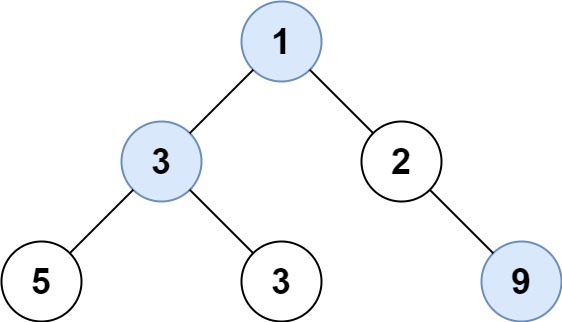LeetCode - Medium - 515. Find Largest Value in Each Tree Row
Topic
- Tree
- Depth-first Search
- Breadth-first Search
Description
https://leetcode.com/problems/find-largest-value-in-each-tree-row/
Given the root of a binary tree, return an array of the largest value in each row of the tree (0-indexed).

Example 1:
Input: root = [1,3,2,5,3,null,9]Output: [1,3,9]
Example 2:
Input: root = [1,2,3]Output: [1,3]
Example 3:
Input: root = [1]Output: [1]
Example 4:
Input: root = [1,null,2]Output: [1,2]
Example 5:
Input: root = []Output: []
Constraints:
- The number of nodes in the tree will be in the range [ 0 , 1 0 4 ] [0, 10^4] [0,104].
- − 2 31 < = N o d e . v a l < = 2 31 − 1 -2^{31} <= Node.val <= 2^{31} - 1 −231<=Node.val<=231−1
Analysis
方法一:BFS
方法二:DFS
Submission
import java.util.ArrayList;import java.util.LinkedList;import java.util.List;import java.util.Queue;import com.lun.util.BinaryTree.TreeNode;public class FindLargestValueInEachTreeRow {//方法一:BFSpublic List<Integer> largestValues(TreeNode root) {List<Integer> result = new ArrayList<>();if(root == null) return result;Queue<TreeNode> queue = new LinkedList<>();queue.offer(root);while(!queue.isEmpty()) {int max = Integer.MIN_VALUE;for(int size = queue.size(); size > 0; --size ) {TreeNode node = queue.poll();if(node.val > max)max = node.val;if(node.left != null)queue.offer(node.left);if(node.right != null)queue.offer(node.right);}result.add(max);}return result;}//方法二:DFSpublic List<Integer> largestValues2(TreeNode root) {List<Integer> result = new ArrayList<>();largestValues2(root, result, 0);return result;}private void largestValues2(TreeNode node, List<Integer> result, int level) {if(node == null) return;if(level >= result.size()) {result.add(node.val);}else {if(result.get(level) < node.val)result.set(level, node.val);}largestValues2(node.left, result, level + 1);largestValues2(node.right, result, level + 1);}}
Test
import static org.junit.Assert.*;import org.hamcrest.collection.IsEmptyCollection;import org.hamcrest.collection.IsIterableContainingInOrder;import org.junit.Test;import com.lun.util.BinaryTree;public class FindLargestValueInEachTreeRowTest {@Testpublic void test() {FindLargestValueInEachTreeRow obj = new FindLargestValueInEachTreeRow();assertThat(obj.largestValues(BinaryTree.integers2BinaryTree(1, 3, 2, 5, 3, null, 9)),//IsIterableContainingInOrder.contains(1, 3, 9));assertThat(obj.largestValues(BinaryTree.integers2BinaryTree(1, 2, 3)),//IsIterableContainingInOrder.contains(1, 3));assertThat(obj.largestValues(BinaryTree.integers2BinaryTree(1)),//IsIterableContainingInOrder.contains(1));assertThat(obj.largestValues(BinaryTree.integers2BinaryTree(1, null, 2)),//IsIterableContainingInOrder.contains(1, 2));assertThat(obj.largestValues(null), IsEmptyCollection.empty());}@Testpublic void test2() {FindLargestValueInEachTreeRow obj = new FindLargestValueInEachTreeRow();assertThat(obj.largestValues2(BinaryTree.integers2BinaryTree(1, 3, 2, 5, 3, null, 9)),//IsIterableContainingInOrder.contains(1, 3, 9));assertThat(obj.largestValues2(BinaryTree.integers2BinaryTree(1, 2, 3)),//IsIterableContainingInOrder.contains(1, 3));assertThat(obj.largestValues2(BinaryTree.integers2BinaryTree(1)),//IsIterableContainingInOrder.contains(1));assertThat(obj.largestValues2(BinaryTree.integers2BinaryTree(1, null, 2)),//IsIterableContainingInOrder.contains(1, 2));assertThat(obj.largestValues2(null), IsEmptyCollection.empty());}}



































还没有评论,来说两句吧...